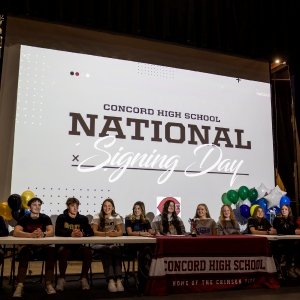State OKs school district charter amendments as community tensions flare
|
Published: 06-25-2024 6:34 PM
Modified: 06-26-2024 11:57 AM |
A group of Concord residents trying to overturn the school board’s vote to place a new middle school on the east side of the city got a green light from the state this week.
Members of Concord Concerned Citizens have proposed changing the independent school board’s charter to require the relocation of any school and the sale of any district property to be authorized by a voter referendum. The first hurdle for a charter amendment is getting sign-off from state officials that the changes are allowed under New Hampshire law, which has come through.
“We’re proving the process,” said Jeff Wells, a co-founder of the group that has pushed the board to reconsider for more than six months. “We’re about allowing the taxpayer to have a say.”
Their mission proceeds as the school board approaches a pivotal decision about how much a new school will cost. The tension between those two sides has become increasingly personal.
Concord School Board’s charter, its governing document, lays out its unique autonomy. No other school board in the state has the final say over its budget and other major decisions without any oversight — most must go through a city council or town meeting. For citizens to change the charter, they must submit their proposed amendments to the state, and a review by the attorney general and secretary of state determines whether those changes are permissible under state law.
With the state’s non-objection, the concerned citizens group can start the next step: getting voter signatures. If they collect more than 1,056 valid signatures — 15% of the voter turnout in the last city election — their amendments will go on the ballot this November.
After initially promising to go after the board’s full autonomy, the leaders of the citizens group tailored the charter amendments to give the public the power to overturn the school location decision made in December.
It’s unclear if that will work.
Article continues after...
Yesterday's Most Read Articles
 Casella Waste Systems’ landfill project in New Hampshire’s North Country denied permit
Casella Waste Systems’ landfill project in New Hampshire’s North Country denied permit
 ‘Less finger pointing, more communication’: Longtime Chichester residents share hopes before second town meeting
‘Less finger pointing, more communication’: Longtime Chichester residents share hopes before second town meeting
 ‘The revenue just isn’t there’: House Finance Committee slashes $271M in jobs, services from Ayotte’s budget proposal
‘The revenue just isn’t there’: House Finance Committee slashes $271M in jobs, services from Ayotte’s budget proposal
 12 Concord student-athletes sign on to play at the collegiate level
12 Concord student-athletes sign on to play at the collegiate level
 ‘There was no oversight’: NH child advocate has been a watchdog for children's care. Now, the office is on the chopping block
‘There was no oversight’: NH child advocate has been a watchdog for children's care. Now, the office is on the chopping block
 Volunteer group wants to help homeless clean up their camp
Volunteer group wants to help homeless clean up their camp
Objecting to the amendments, a lawyer for the district argued that, because the school board has already voted on the new middle school location, putting the location decision on the ballot would violate the New Hampshire’s legal precedent against retroactive laws.
That decision might go before a judge.
“The State Departments take no position on whether retroactive application of the Charter Amendment would be unlawful,” Assistant Attorney General Brendan O’Donnell wrote. “Rather, that is an issue better resolved by the courts.”
School Board President Pamela Walsh has said for months that backtracking on the location decision — after the board entered into a $10 million architect contract and developed a schematic design — would cost Concord many months of progress and taxpayer dollars and could put its eligibility for state building aid at risk.
The school board has spent the last several weeks asking residents which design features — such as different heat types, performing arts spaces and gyms — they prefer. In mid-July, the board will set a not-to-exceed budget for the full project should it move forward with construction. Their latest figure hovers around $152 million.
At one of those recent Q&A sessions, board members gave their most effuse and expressive public defenses of the location vote since it was made.
To those who see the planned clearing of as many as 19 acres of trees to make way for the new school as tragic, new board member Jess Campbell said, “you’re right. I hate it. And I’m really sorry, I know that’s not good enough.”
“However,” said Campbell, who previously favored rebuilding at Rundlett and has since changed her mind. “It is unfortunately a tough decision that I agree with.”
Campbell and other board members highlighted the Broken Ground site’s proximity to forest and trails — giving it both ecological learning resources and room to grow — as a key asset.
“I live in this area. This is my home. I taught at Broken Ground for 25 years. I know what that means to the people in the community and I know the wonderful benefits that the area provides,” said Brenda Hastings, who was in the minority favoring a rebuild in the South End last year but, like Campbell, also announced that she has changed her mind. “We get that you don’t trust us. We get it. You’ve made it very clear. We’re hoping by having these conversations with you that you’ll understand where we’re coming from, why we’re making the decisions we’re making.”
Their case was met by continued objection from those in the audience, some of whose remarks included personal jabs.
“We are not in this together,” Chris O’Connor said. “With conduct that smacks of timidity and cowardice, the school board has allowed the December vote to stand.” He said Hastings and Campbell had “drunk the Kool Aid” and “would rather betray the people of Concord than upset the Broken Ground faction.”
An online petition against the Broken Ground location has garnered more than 1,500 signatures since Concerned Citizens launched it in February — given that, Wells sees it as likely that the group will be able to get 2,000 signatures, nearly double the amount required to get their amendment on the ballot.
In starting the charter process, the group has made a bet: not only that a supermajority of Concord voters agree with them on the location, but that their level of outrage is shared.
At the Q&A, others who spoke took a more measured tone.
“Thank you to those that were on the board in December: That was a difficult thing to do by even taking the vote,” said South End resident Ian McGregor. “Thank you for sticking to your guns.”
“I don’t agree with it,” he continued — and, indeed, he went on to raise zoning concerns with the neighborhoods around Broken Ground — “but that doesn’t make you bad people.”










 Henniker ponders what is a ‘need’ and what is a ‘want’
Henniker ponders what is a ‘need’ and what is a ‘want’ Boscawen residents vote to fund major renovation of public works building
Boscawen residents vote to fund major renovation of public works building ‘Voting our wallets’: Loudon residents vote overwhelmingly against $1.7M bond for new fire truck
‘Voting our wallets’: Loudon residents vote overwhelmingly against $1.7M bond for new fire truck In Pembroke, Education Freedom Accounts draw debate, voters pass budget
In Pembroke, Education Freedom Accounts draw debate, voters pass budget
